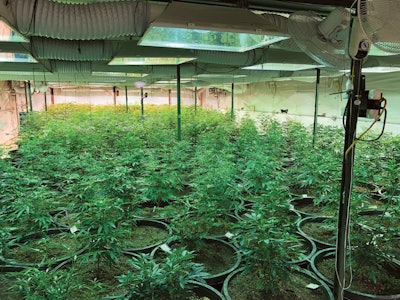
About two years ago, Dicot Farms faced a devastating reality. A pesky insect was on the verge of wiping out the entire crop at the Phoenix-based operation, says Anthony Czech, the site’s quality control director.
“At one time, when we were infested with the russet mite, we were looking at losing the entire crop and possibly the whole business,” Czech says. “We were cutting down plants left and right because they were so damaged from these russet mites. There was a time when I saw about 30 plants being cut down a day, and that will add up really quick.”
Czech found the solution to his problem at a conference, where he met representatives from ARBICO Organics, a company that specializes in natural pest-control treatments. The ARBICO experts introduced Czech to a variety of biological pest solutions.
The application of a sulfur spray and predatory mites provided the one-two punch that Dicot Farms needed to save its crop, according to Czech.
“There are many different types of predator mites, and through [ARBICO’s] guidance we were able to win the bug war,” Czech says. “There were no harsh chemicals used and all organically done.”
A chemical pesticide wasn’t an option for Dicot Farms because the company markets its product as all-organic.
The sulfur spray and predatory mites are part of a preventive pest management program that also includes the use of nematodes, ladybugs and lacewings, as well as compost teas and neem oil to combat pests before they become a major problem, Czech says.
Each method treats different types of conditions and is part of a regular treatment schedule. For example, Dicot Farms mixes nematodes with its regular watering process, which it performs three times a week, Czech says. The nematodes help fight fungus gnats. Ladybugs help fight aphids or thrips.
“It’s very effective,” Czech says. “You can literally see these ladybugs attack the pests.”
The preventive treatments have become part of an ecosystem that prevents infestations while encouraging growth, Czech says. “They also help with the soil. As they eat these bugs, they defecate in the soil, and that becomes nutrients for the plants.”
















